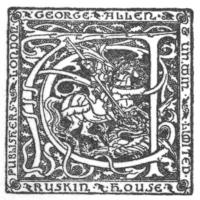READERS & WRITERS
Readers and Writers
(1917-1921)
By
R. H. C. (A. R. Orage)

LONDON: GEORGE ALLEN & UNWIN LTD.
RUSKIN HOUSE, 40 MUSEUM STREET, W.C. 1
First published in 1922
All rights reserved
Under the title of “Readers and Writers”and over the initials “R. H. C.” I contributedto the New Age, during a period ofseven or eight years, a weekly literarycauserie of which the present volume,covering the years 1917-1921, is a partialreprint. My original design was to treatliterary events from week to week with thecontinuity, consistency and policy ordinarilyapplied to comments on current politicalevents; that is to say, with equal seriousnessand from a similarly more or less fixed pointof view as regards both means and end. Thisdesign involved of necessity a freedom ofexpression rather out of fashion, though itwas the convention of the greatest period ofEnglish literature, namely, the EighteenthCentury; and its pursuit in consequencebrought the comments into somewhat livelydisrepute. That, however, proved not to bethe greatest difficulty. Indeed, within thelast few years an almost general demand[6]for more serious, more outspoken and evenmore “savage” criticism has been heard, andis perhaps on the way to being satisfied, thoughliterary susceptibilities are still far from beingas well-mannered as political susceptibilities.The greatest difficulty is encountered in thefact that literary events, unlike political events,occur with little apparent order, and aresubject to no easily discoverable or demonstrabledirection. In a single week everyliterary form and tendency may find itselfillustrated, with the consequence that anyattempt to set the week’s doings in a relationof significant development is bound to fallunder the suspicion of impressionism orarbitrariness. I have no other defence againstthese charges than Plato’s appeal to goodjudges, of whom the best because the last isTime. Time will pronounce as only those livingcritics can whose present judgments are ananticipation of Time’s. Time will show whathas been right and what wrong. Already,moreover, a certain amount of winnowing andsifting has taken place. Some literary valuesof this moment are not what they wereyesterday or the day before. A few aregreater; many of them are less. My most[7]confident prediction, however, remains to beconfirmed: it is that the perfect English styleis still to be written. That it may be in ourown time is both the goal and the guiding-starof all literary criticism that is not idlechatter.
A. R. ORAGE.
The New Age, 38 Cursitor Street, E.C. 4.
December 1921.